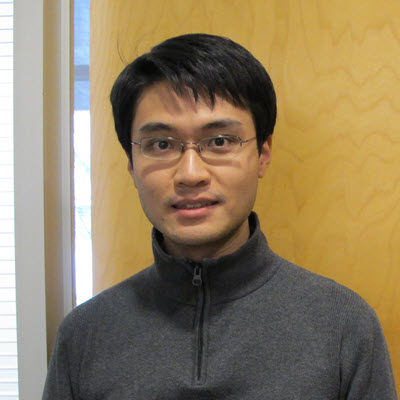
Research Interests
Autophagy, Cancer, Rare Diseases
Research Focus Teams
Cancer, Rare Diseases
Departments
Biochemistry & Molecular Biology
Contact
Email: calvin.yip@ubc.ca
Office Phone: phone: 604–827–3976
Publications
Lab Website
University of British Columbia, 2001, B.Sc.(Honours)
University of British Columbia, 2006, Ph.D.
Harvard Medical School, 2010, Postdoctoral Fellow
Awards
2012 CIHR New Investigator Award
2011 Michael Smith Foundation for Health Research Career Investigator Award
2009 CIHR Jean-François St-Denis Prize
2006 Jane Coffin Childs Memorial Fund Fellowship
2006 Lionel E. McLeod Health Research Scholarship
Knowledge and Technology Translation
2014/9 Committee Member, Research Uptake Strategies
Participate in a new initiative to establish a pan-Canadian
autophagy research network to enhance cross-disciplinary, collaborative
research and engagement with clinicians and other potential end-users of
knowledge
2011/8 Member, Technology, Product, Process, Service Improvement Development
As a member of the Network of Canadian expert in cryo-EM
technology that was established to facilitate the introduction and application of
cutting edge molecular imaging technology methods to the Canadian biomedical
research community.
2011/1 Leader, Technology, Product, Process, Service Improvement Development
Introduce single-particle electron microscopy (EM)
molecular imaging method to the BC biomedical research community through
obtaining CFI/BCKDF funding to establish core infrastructure, co-directing
the UBC LSI transmission electron microscopy facility, developing a training
program on this technology suitable for non-specialist, and co-leading a CFI
Innovation Fund 2015 application to leverage for more advanced electron
microscopy for high-resolution molecular imaging.
Autophagy is an evolutionarily conserved pathway that encapsulates large objects to be degraded in a double-membrane vesicle called the autophagosome and targeting this cargo to the lysosome for breakdown. Defects in autophagy have been implicated in many human diseases, ranging from neurodegenerative disorders (eg. Alzheimer’s, Parkinson’s, ALS), cancer, and infections by microbial pathogens. Our research program seeks to obtain a comprehensive understanding the fundamental molecular mechanisms of autophagy and through the knowledge gain identified suitable molecular targets for therapeutic intervention. More specifically, our research team uses cutting edge single-particle electron microscopy molecular imaging, yeast genetics, and other biochemical and biophysical approaches to characterize the molecular functions of the specialized group of proteins called Atg proteins that mediate the different steps of autophagy.
Molecular machinery of the autophagy degradation pathway
How does a cell remove and recycle unwanted materials? Autophagy is an evolutionarily conserved pathway that sequesters cytoplasmic materials a double-membrane vesicle called the autophagosome and targeting this cargo to the lysosome for breakdown. Defects in this pathway have been implicated in neurodegenerative disorders, cancers, and other human diseases. We study the molecular machinery that mediates the different steps of this important membrane trafficking and degradative pathway using protein biochemistry, structural biology, and cell biology approaches.
Chromatin modifying complexes
How does a cell establishes and maintains its gene expression pattern and adapts this to different environmental conditions? Eukaryotic genomic DNA exists in a DNA-protein complex known as chromatin. Post translational modifications to the histone proteins that form the nucleosome, the most basic unit of chromatin, is a key mechanism to regulate chromatin structure and gene expression. We study how specialized multi-protein chromatin modifying complexes carry out their physiological functions using biochemical and structural biology approaches.
Molecular investigations of rare diseases
It is estimated that 1 in 12 Canadians has a rare disorder (defined as a condition that affects fewer than 1 person in 2000 in the general population). There are over 7,000 rare diseases and very few if any treatments are available for the majority of these diseases. We are leveraging cutting edge single-particle cryo-EM technology to study characterize proteins and macromolecular assemblies associated with a number of rare diseases. This research is facilitated by in the in-house UBC Life Science Institute cryo-EM facility that operates a state-of-the-art Titan Krios transmission electron microscope.